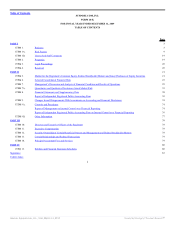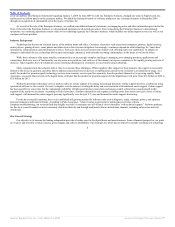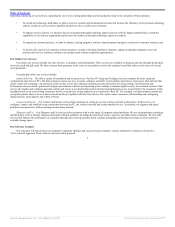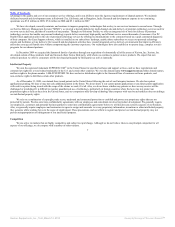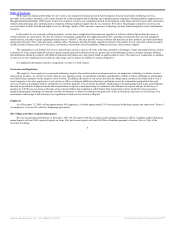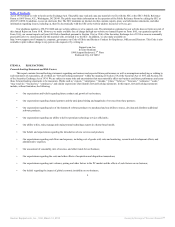Support.com 2009 Annual Report Download - page 13
Download and view the complete annual report
Please find page 13 of the 2009 Support.com annual report below. You can navigate through the pages in the report by either clicking on the pages listed below, or by using the keyword search tool below to find specific information within the annual report.
Table of Contents
Our inability to meet future financial performance targets that we announce or that are published by research analysts could cause the market price of
our common stock to decline.
From time to time, we provide guidance related to our future financial performance. In addition, financial analysts may publish their own expectations of
our future financial performance. Because our quarterly revenue and our operating results fluctuate and are difficult to predict, future financial performance is
difficult to predict. In the past, we have failed to meet our guidance and our stock price has declined. Generally, the market prices of technology companies have
been extremely volatile. Stock prices of many technology companies have often fluctuated in a manner unrelated or disproportionate to the operating
performance of such companies. In the past, following periods of market volatility, stockholders have often initiated securities class action litigation relating to
the stock trading and price volatility of the technology company in question. Any securities litigation we may become involved in could result in our incurring
substantial defense costs and diverting resources and the attention of management from our business.
Our Enterprise business historically generated a substantial portion of our revenue. After its sale we are a smaller company, and in order to succeed,
we will need to achieve profitability in our Consumer business.
In June 2009, we sold our Enterprise business, which has historically been the source of a substantial portion of our revenue. For the fiscal year ended
December 31, 2009, revenue from our continuing operations was $17.5 million. In order to succeed, we will need to achieve profitability in our Consumer
business. Given that the sole focus of our business is now our Consumer operations, expectations from stockholders and analysts that we produce improved
financial results for our Consumer business are heightened as compared to the periods prior to the sale of the Enterprise business, when the diversity of our
revenue streams could enable one of our segments to offset weakness in the other segment.
Because a small number of customers and channel partners have historically accounted for and may in future periods account for the substantial
majority of our revenue, delays of specific programs or losses of certain customers could decrease our revenue substantially.
In 2009, one customer, Office Depot, accounted for the substantial majority of our total revenue after giving effect to the sale of our Enterprise business.
Although we are implementing and expanding programs with several other channel partners, Office Depot will, at least in the near term, account for a substantial
majority of our total revenue. Over the course of 2009, the percentage of revenue attributable to Office Depot has decreased each quarter. We expect the percent
of revenue attributable to Office Depot to decline further in 2010 as we expand our service channel partnerships and grow our software business. Our agreement
with Office Depot has a limited initial term and provides for a renewal period if agreed to by the parties. Even if the agreement continues to be renewed,
however, it does not require Office Depot to do any minimum amount of business with us, and therefore Office Depot could decide at any time to reduce or
eliminate its use of our services. Our revenue could decline significantly because of the loss or decline in activity of Office Depot or the delay or loss of a
significant program by other channel partners. Additionally, we may not obtain new channel partners or customers. The failure to obtain significant new channel
partners or the loss or decline of significant channel partners would have a material adverse effect on our operating results. Further risks associated with the loss
or decline in a significant channel partner are detailed in “Our failure to establish and expand successful partnerships to sell our services and products would
harm our operating results” below.
Our failure to establish and expand successful partnerships to sell our services and products would harm our operating results.
Our current business model requires us to establish and maintain relationships with third parties who market and sell our services and products. Failure to
establish or maintain third-party relationships in our business, particularly with firms that sell our services and products, could materially and adversely affect the
success of our business. We sell to numerous consumers through each of these channel partners, and therefore a delay in the
12
Source: Support.com, Inc., 10-K, March 12, 2010 Powered by Morningstar® Document Research℠


